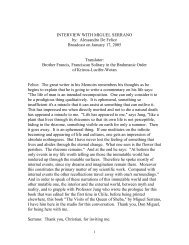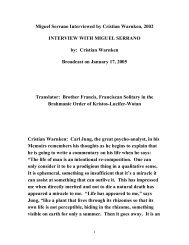<strong>Rune</strong>-<strong>Magic</strong>, <strong>by</strong> <strong>Siegried</strong> <strong>Adolf</strong> <strong>Kummer</strong>7/7/11 12:15 AMreads in translation:'So I saw the barbarians (in Germania) on the otherside of the Rhine singing passionate tunes with wordswhich resembled the cry of cackling hens, and (I saw)their joy in these songs.'Forgive me, if this translation is incorrect! On the basis of thispassage, stories have always been told about how the singing ofGermanic folk resembled the croaking of birds of prey."Julian, who himself fought against the Germanic peoples, probably does nothave in mind here the battle song of the Germanic tribes. In this case hewould probably have said: "So I heard," instead of "So I saw." Because ofthis latter expression, as well as the emphasis on the joy of the Germanicpeople in these melodies described as being passionate, one begins tosuspect that the passage deals with the observation of a legislative Thingassemblyof a Germanic tribe supporting the field commander, then alliedwith the Romans. His comparison of the reported manner of song with thecackling of hens, in spite of the apparently disparaging manner ofexpression of a foreign observer, is nonetheless quite vivid, and one canrecognize in this an authentic description of yodeling, when one thinksabout the first part of the stanza, arranged for several voices, with the longdrawn out ending.Since Julian's Germanic campaign obviously did not concern mountainpeople whose customs he was observing, his testimony may thereforefurther serve to establish the fact that yodeling as Runic and sacralized songwas the expression of a widespread, common Germanic custom. Its presentoccurrence only among the residents of the Alps demonstrates to us thetenacity of the life-span of ancient Germanic ethnic treasures, which mustbe described as spiritual treasures. So, again, it is not difficult to recognizethe manner of the barditus, or battle song, described <strong>by</strong> Tacitus in hisGermania in part as yodeling. He writes:"Further, they know such songs called barditus; through their utterance theyquicken the spirit of battle, and from the song itself they prophesy theoutcome of the coming engagement. As the song rises out of the ranks, theyarouse fear or foster fear, and the song expresses, as it were, almost the beatof brave hearts as the joined sound of single voices. Primarily, it is in a rawtone and almost a muffled din. While singing, they hold their shields infront of their mouths to allow the sound to swell fuller and stronger throughhttp://www.american-buddha.com/cult.runemagic.kummer.htmPage 22 of 64
<strong>Rune</strong>-<strong>Magic</strong>, <strong>by</strong> <strong>Siegried</strong> <strong>Adolf</strong> <strong>Kummer</strong>7/7/11 12:15 AMfront of their mouths to allow the sound to swell fuller and stronger throughthe echo." [19]Through the previous exercises, new light falls on this famous passage.Guido von List gives an enlightening explanation in his Ursprache fur dieJodlerart der Selbstlaute [Primeval-Language for Yodeling the Vowels], asto how yodeling is involved with ancient Germanic customs. He directsour attention to the threefold mystical sense added in ancient times tothe vowels A, E, I, 0, U. [20] This idea still has echoes in the fact that a! isthe outburst of amazement, of wonderment, but also of contempt. Likewise,e! is the cry of a sense of justice, of regret and of inhibition; i! is the cry ofinwardness, of stress of the ego or of the individual personality, as well asof fear; while o! serves as the expression of pain, of aversion and of fear ofdeath; as u! serves as a shout of joy and surprise, of spurring on toenergetic endeavor, and as a cry of terror. The Germanic people werethoroughly shaped <strong>by</strong> mystical values.This ancient sense of the vowels is again related to their mystical primalmeaning as symbolic sounds, namely, a as the fundamental sound of themeaning of shaping [Schaffen] and mastering [Walten]; e as thefundamental sound of decreeing [Gesetz], ethics [Recht] and being [Leben];i is the fundamental sound of inwardness, of spiritual light; o is thefundamental sound for the corporeal, for order; u is the fundamental soundfor that which was perfected in the pre-temporal All-Perfected -- the Ur --the Height, ruling from the Beyond.These developments in the study of language strengthen the view that theage of yodeling reaches back deep into the earliest times of the Aryo-Germanic tribes."The Borgias," <strong>by</strong> Alexandre Dumas, Perehttp://www.american-buddha.com/cult.runemagic.kummer.htmThe Imperial throne was occupied <strong>by</strong> FredericIII, who had been rightly named the Peaceful, notfor the reason that he had always maintainedpeace, but because, having constantly beenbeaten, he had always been forced to make it.The first proof he had given of this veryphilosophical forbearance was during his journeyto Rome, whither he betook himself to beconsecrated. In crossing the Apennines he wasPage 23 of 64
- Page 3 and 4: Rune-Magic, by Siegried Adolf Kumme
- Page 5 and 6: Rune-Magic, by Siegried Adolf Kumme
- Page 7 and 8: Rune-Magic, by Siegried Adolf Kumme
- Page 9 and 10: Rune-Magic, by Siegried Adolf Kumme
- Page 12 and 13: Rune-Magic, by Siegried Adolf Kumme
- Page 14 and 15: Rune-Magic, by Siegried Adolf Kumme
- Page 16 and 17: Rune-Magic, by Siegried Adolf Kumme
- Page 18 and 19: Rune-Magic, by Siegried Adolf Kumme
- Page 20 and 21: Rune-Magic, by Siegried Adolf Kumme
- Page 24 and 25: Rune-Magic, by Siegried Adolf Kumme
- Page 26 and 27: Rune-Magic, by Siegried Adolf Kumme
- Page 28 and 29: Rune-Magic, by Siegried Adolf Kumme
- Page 30 and 31: Rune-Magic, by Siegried Adolf Kumme
- Page 32 and 33: Rune-Magic, by Siegried Adolf Kumme
- Page 34 and 35: Rune-Magic, by Siegried Adolf Kumme
- Page 36 and 37: Rune-Magic, by Siegried Adolf Kumme
- Page 38 and 39: Rune-Magic, by Siegried Adolf Kumme
- Page 40 and 41: Rune-Magic, by Siegried Adolf Kumme
- Page 42 and 43: Rune-Magic, by Siegried Adolf Kumme
- Page 44 and 45: Rune-Magic, by Siegried Adolf Kumme
- Page 46 and 47: Rune-Magic, by Siegried Adolf Kumme
- Page 48 and 49: Rune-Magic, by Siegried Adolf Kumme
- Page 50 and 51: Rune-Magic, by Siegried Adolf Kumme
- Page 52 and 53: Rune-Magic, by Siegried Adolf Kumme
- Page 54 and 55: Rune-Magic, by Siegried Adolf Kumme
- Page 56 and 57: Rune-Magic, by Siegried Adolf Kumme
- Page 59 and 60: Rune-Magic, by Siegried Adolf Kumme
- Page 61 and 62: Rune-Magic, by Siegried Adolf Kumme
- Page 63 and 64: Rune-Magic, by Siegried Adolf Kumme





